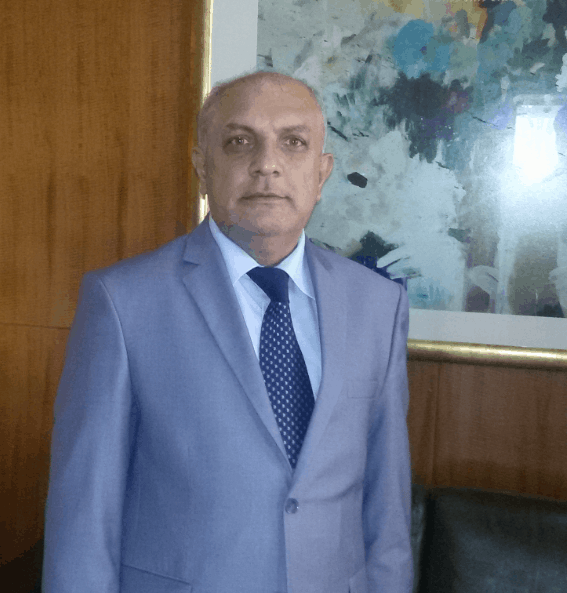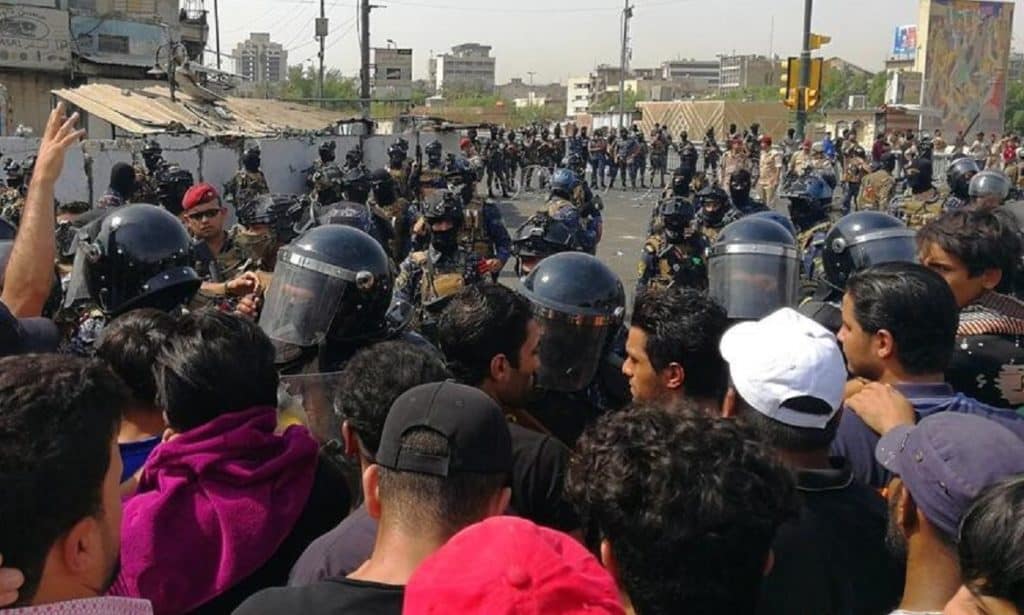Denis Korkodinov – Interview with Adil Muhsen Al Maalke
The protests in Iraq are gaining strength again after a brief break for several days. Protesters organize barricades in Baghdad and in areas south of the Iraqi capital, as the government of Adil Abdul-Mahdi seems not to be planning political reforms. Meanwhile, a number of international players, and, above all, the United States, are clearly trying to take advantage of the situation in order to organize a new military invasion of Iraq. However, if in 2003 the goal of American intervention was to fight the regime of Saddam Hussein, now we can talk about limiting Iranian influence in Baghdad.
Especially for World Geostrategic Insights, we talked about this with Adil Muhsen Al Maalke, member of the executive body of the Union of Journalists of Iraq, President of the Iraqi Electronic Press Network.
 1. For more than one month, protests in Iraq have not subsided. Many experts, including members of our editorial board, see, as the main reason for the intensification of the protest movement, the resignation from the post of commander of the Iraqi counterterrorism forces Abdul Wahab al-Saadi. Sources indicate that the general was a valuable source of information for the United States. However, his resignation, caused by rivalry with the leadership of the Iraqi militia (Hashd al-Shaabi), created a number of inconveniences for the White House administration. In particular, with the resignation of Abdul Wahab al-Saadi, Washington lost the opportunity to receive secret information about the activities of the armed forces of official Baghdad and exert influence on the government of Adil Abdul-Mahdi. Is it really? Does this indicate that through protests Washington and Tehran are trying to sort things out among themselves in Iraq? How likely is it that Abdul Wahab al-Saadi can directly or indirectly be the leader of the protest movement in Iraq?
1. For more than one month, protests in Iraq have not subsided. Many experts, including members of our editorial board, see, as the main reason for the intensification of the protest movement, the resignation from the post of commander of the Iraqi counterterrorism forces Abdul Wahab al-Saadi. Sources indicate that the general was a valuable source of information for the United States. However, his resignation, caused by rivalry with the leadership of the Iraqi militia (Hashd al-Shaabi), created a number of inconveniences for the White House administration. In particular, with the resignation of Abdul Wahab al-Saadi, Washington lost the opportunity to receive secret information about the activities of the armed forces of official Baghdad and exert influence on the government of Adil Abdul-Mahdi. Is it really? Does this indicate that through protests Washington and Tehran are trying to sort things out among themselves in Iraq? How likely is it that Abdul Wahab al-Saadi can directly or indirectly be the leader of the protest movement in Iraq?
– At the beginning of the conversation about the main reasons for the mass protests that take place in Iraq, it is necessary to consider the nature of the life of Iraqi citizens, who, for the most part, are deprived of basic rights and livelihoods, despite the fact that Iraq is rich in oil resources.
The first blow to the Iraqi economy was inflicted during the Iran-Iraq war, which the country’s national wealth created the basis for a protracted economic crisis. The exacerbation of this crisis has significantly affected the standard of living of Iraqi citizens. However, the political parties of the state, instead of helping the people alleviate the difficult financial situation of the people, after the overthrow of the regime of Saddam Hussein began to seize the remaining national wealth, not paying any attention to ordinary people.
Therefore, the dismissal of Lieutenant General Abdula Wahab al-Saadi was not the cause of the protests, but most likely a consequence of the rule of corrupt political parties and the damage they caused to the governance of Iraq.
Regarding the fact that the United States lost an important source of information, this is a fiction because Washington has military advisers in the Iraqi army and other security forces, so this was not the only source that actually worked with them in secret.
Unfortunately, Iraq has become an arena for resolving internal and external problems. Therefore, it is quite natural that the political game between the United States and its allies, on the one hand, and Iran, on the other, was reflected in the protest movement.
Currently, the protests in Iraq do not have a leader, but there are those who influence the Iraqi street through targeted media. For this reason, Abdul Wahab al-Saadi cannot lead the crowd, despite the fact that he is very popular.
2. Against the backdrop of the development of the protest movement, Baghdad began to actively consider Turkey and Jordan as alternative routes for the export of oil from Basra. For this reason, the Iraqi government is rushing Turkish and Jordanian investors to expand pipeline projects as soon as possible in order to save the Iraqi economy. In this regard, the social unrest in Iraq significantly strengthened the position of Ankara and Amman in the region. In this regard, is it fair to say that Turkey and Jordan, to some extent, are interested in the fact that protests in Iraqi cities do not stop as long as possible, since the cessation of protests may cast doubt on plans to build alternative routes for transporting oil from Iraq? How big is the influence of Turkey and Jordan in the social unrest in Iraq?
– The transportation and sale of oil through Turkey or Jordan is not a new project. And this project arose even before the start of the protests that are now taking place in Iraq.
Indeed, Baghdad has been considering changing course since Prime Minister Adele Abdul-Mahdi came to power because Iran’s threats to close the Strait of Hormuz have had a negative impact on the economies of several countries, including Iraq. For this reason, we intended to secure oil supplies through the development of new routes. And, in this case, the interests of Baghdad, Ankara and Amman coincided in a very successful way.
It is worth noting that today Turkey and Jordan have no intention to participate in the development of the protest movement in Iraq. The fact is that for the development of economic projects stability is necessary, which is impossible in the conditions of unrest. In this regard, our partners have a great interest in stopping the protests.
3. On November 6, 2019, Turkish news agencies published information that Turkish aviation had destroyed 6 militants of the Kurdistan Workers Party in northern Iraq. At the same time, news that under the pretext of eliminating Kurdish militants, Ankara has been increasing its military presence in Iraq over the past month, appears almost every day. In addition, Recep Erdogan has repeatedly accused the Iraqi government of contributing to harboring members of the YPG banned in Turkey. All this happens against the backdrop of social unrest in Iraq. Thus, can Ankara influence protest activity in Iraq?
– Unfortunately, Ankara crossed the border with respect to the sovereignty of Iraq, which is confirmed by the long presence of the Turkish armed forces in the northern part of our country. This turned out to be possible as a result of the fact that Iraq, busy with the struggle against the “Islamic state”, paid little attention to the actions of the Turks. At the same time, Turkey is unlikely to be able to influence the protests in Iraq, as I already mentioned in my previous answer.
Despite Turkey’s obvious claim to Mosul, Recep Erdogan will not jeopardize relations with official Baghdad due to protests.
4. The great Ayatollah Ali al-Sistani recently met with the head of the UN mission in Iraq, Janine Hennis-Plasschart. The purpose of this meeting was to discuss protests and develop a plan to overcome the crisis. In particular, the great ayatollah noted that reforms are needed in the country that can reassure the Iraqi people. What effect does Ali al-Sistani have on the protest leaders in Iraq? How likely is it that the reforms proposed by the great ayatollah will be approved by the Iraqi government? Is there a risk of the next entry of American troops into Iraq, as it was in 2003?
– The protests and demonstrations that took place in Iraq are a mixture of the components of Iraqi society: Shiites, Sunnis, Christians and Kurds. However, most of the protesters are Shiites, whose supreme ayatollah is Ali al-Sistan. Therefore, it is quite normal that he represents the interests of the protesters and is the link between them and international organizations. And since the opinion of the Great Ayatollah is heeded, it can very well influence demonstrators, politicians, and the world community.
The Iraqi parliament takes seriously the support of Ali al-Sistani, provided to the demonstrators to fulfill the legal requirements for reforming the country’s political and government system.
However, the parliament and government of Iraq are currently in a very difficult situation, because the reforms required by the demonstrators can lead to a series of high-profile resignations and court cases.
US President Donald Trump published a joyful tweet about the protest movement in Iraq shortly before the burning of the Iranian diplomatic mission in Karbala. In addition, a number of protesters are associated with the US military. Therefore, we do not exclude that the United States may directly or indirectly intervene in Iraqi events. However, so far there is no indication that Washington is preparing a military invasion of Iraq under the 2003 scenario. But everything can change at any time.
Image Credit: KHALID MOHAMMED / AP







